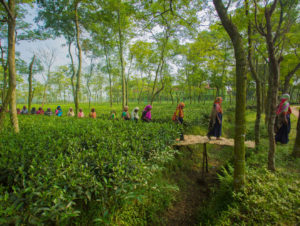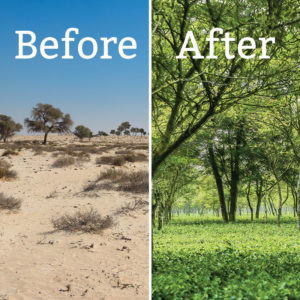
After water, tea is the most popular beverage in the world. At 1.93 tons of tea, India produces the most, followed by China (1.2 million) and Kenya (0.44 million). Asia produces the most tea, at around 4 million tons. Bangladesh ranks 10th in the world, accounting for 3% of global tea production and employing more than 4 million people.

Teatulia plantation, Bangladesh
A 2018 report by the Food and Agriculture Organization of the United Nations projects that world production of black tea will rise by 2.2% annually over the next decade to reach 4.4 million tons. Green tea production will rise by a steep 7.5% annually, to reach 3.6 million tons in 2027.
The report warns that “tea production is highly sensitive to changes in growing conditions. Tea can only be produced in narrowly defined agro-ecological conditions and, hence, in a very limited number of countries, many of which will be heavily impacted by climate change. Changes in temperature and rainfall patterns, with more floods and droughts, are already affecting yields, tea product quality and prices, lowering incomes and threatening rural livelihoods.” The organization expects these climate changes to intensify and highlights that there is a growing need to contribute to climate change mitigation by reducing carbon emissions from tea production and processing.

Teatulia plantation before and after
Teatulia is a Colorado-based tea company founded in 2000 with plantations in Tetulia, Northern Bangladesh. It uses “an intentional business model that seeks to positively impact all stakeholders and externalities from garden to cup/glass/can, leaving our world better than we found it.”
It sources its teas responsibly from its own certified organic tea garden. As one of the largest organic tea gardens in the world, it is not just sustainable – it is regenerative. By using only natural farming methods, it is improving the soil and rejuvenating the land.
Teatulia created its tea garden as a social enterprise designed to create jobs in a remote and impoverished region of Bangladesh. All tea sales support the cooperative:
Teatulia makes its earth-friendly eco-canisters with recyclable and compostable materials using post-consumer waste. It designed its tea bags with less waste in mind, free of excess packaging like strings, tags and staples. Its retail packaging alone saved more than 10,000 tons of waste from landfill in 2018.
Additionally, it makes its tea bags from unbleached, compostable materials that are both GMO-free and chemical-free: plants for the pyramid tea bag and unbleached paper for the square tea bag.
| Cookie | Duration | Description |
|---|---|---|
| cookielawinfo-checbox-analytics | 11 months | This cookie is set by GDPR Cookie Consent plugin. The cookie is used to store the user consent for the cookies in the category "Analytics". |
| cookielawinfo-checbox-functional | 11 months | The cookie is set by GDPR cookie consent to record the user consent for the cookies in the category "Functional". |
| cookielawinfo-checbox-others | 11 months | This cookie is set by GDPR Cookie Consent plugin. The cookie is used to store the user consent for the cookies in the category "Other. |
| cookielawinfo-checkbox-necessary | 11 months | This cookie is set by GDPR Cookie Consent plugin. The cookies is used to store the user consent for the cookies in the category "Necessary". |
| cookielawinfo-checkbox-performance | 11 months | This cookie is set by GDPR Cookie Consent plugin. The cookie is used to store the user consent for the cookies in the category "Performance". |
| viewed_cookie_policy | 11 months | The cookie is set by the GDPR Cookie Consent plugin and is used to store whether or not user has consented to the use of cookies. It does not store any personal data. |
